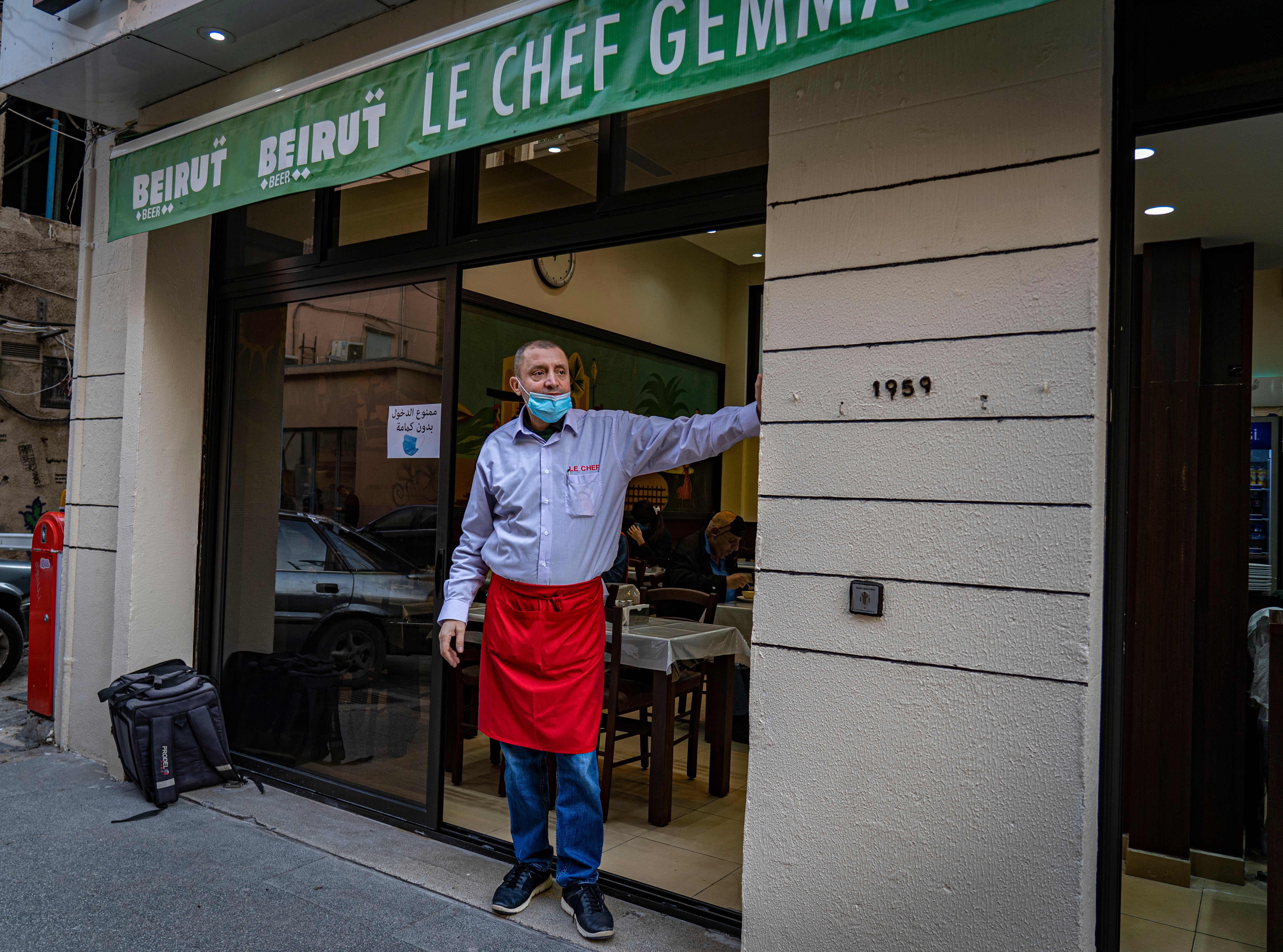‘Russell Crowe is our Godfather’: Donations from across the world help Beirut restaurants get back on their feet
A small family-run restaurant in Beirut has been overwhelmed by the generosity of the donations it received after the blast, including from one very special patron. Bel Trew speaks to those tentatively reopening their doors after disaster


Glancing into the unassuming Beirut eatery, few would realise that amid the plastic-clad tables and customers bent over fragrant plates of stuffed mutton lies a connection to Hollywood.
Le Chef, a small Lebanese family restaurant, has been a mainstay on the city’s famed Gourand Street for 53 years despite several wars. Its owner Charbel Bassil regales newcomers with tales of navigating checkpoints and shelling with his father to get to work.
But on 4 August it was blown up in the Beirut port blast, one of the largest non-nuclear explosions in modern history.
Charbel was seriously wounded alongside several staff members and customers. Caught between a pandemic and Lebanon’s unprecedented financial collapse, Le Chef nearly closed its doors for good. Until 13,000km away Russell Crowe unexpectedly stepped in, donating $5,000.
“I thought a bomb had landed on the restaurant. Everything was destroyed, everything exploded on me,” Charbel says, pointing the scars on his arms and head.
He describes trying to drive the wounded over dunes of shattered glass and masonry to the local hospitals which were themselves wrecked. The restaurant, meanwhile, looked like warring tornadoes had been unleashed inside of it.
“We wanted to remain open but there was so much damage we would have had to serve customers from a shell [of a place],” he continues.
The flood of donations allowed Charbel to mend the restaurant, helped by the Gladiator star who at the time said he donated the money on behalf of the late famed chef Anthony Bourdain who visited Le Chef in 2006 and raved about its kibbeh, stewed lamb and hummus.
“We call Russell Crowe the Godfather of Le Chef,” Charbel adds with a flick of emotion in his voice.
“He has helped us so much. Many people saw his donation and followed suit.”
This week, after the online campaign raised nearly $20,000, Le Chef was finally able to serve its customers again, joining several other restaurants and businesses nearby which, also bolstered by donations, have reopened.
Against all the odds, there has been a tentative reawakening in Beirut’s neighbourhoods that were hit by the blast which killed over 200 people and injured thousands more.
The August blast was thought to have been caused by tens of thousands of poorly stored explosive materials catching fire in the capital’s nearby port.
The government, which knew about the dangerous stockpile, eventually resigned amid mounting fury at their lack of action to help those left injured, homeless and jobless by the explosion.
Instead volunteers took to the streets to clear the rubble and many like Charbel, were forced to rebuild their homes and businesses with the help of charities and fundraising campaigns.
The city has become awash with clipboard-wielding citizens trying to assess and repair the damage without the help of the state. Gourand Street, which winds its way into Armenia Street, is busy with building works.
Just a few doors down from Le Chef, Aaliya’s Books, an independent bookstore, cafe, literary bar and much-loved haunt of journalists and charity workers, has also reopened for the first time since August.
Seconds before the explosion, its Irish co-owner Niamh Fleming-Farrell rushed outside after she heard an initial boom and what sounded like a plane.
The next thing she remembers is walking dazed down the ravaged street, with blood-soaked people staggering along beside her. She has no recollection of being knocked unconscious.
Aaliya’s was completely gutted and flanked by partially collapsed buildings that to this day teeter ominously over the road. Reopening during a pandemic, while Lebanon continues to limp through a financial collapse that has seen the currency lose over 80 per cent of its value, seemed impossible.
But then the donations came flooding in.
“It was really humbling and overwhelming, particularly the reach of those giving, from regulars to people who’d visited Lebanon and been here once,” Niamh says from the cafe, which looks as good as new, bar a few pock marks along the bar and walls.
The generosity included unexpected gifts from her native Ireland. She says a small independent bookstore in Westport, County Mayo, who had no connection to them, even sent a box of books so they could start their collection again.
“It was comforting that people who are so far away are interested in what is going on here even in the time of the pandemic when no one is feeling financially comfortable or safe,” she adds.
It spurred the team to keep going. The transformation is incredible: behind Niamh her customers snuggle down into sofas reading and working serenely.
Back at Le Chef, sitting at the spotless tables, while meat and fish stews gently bubble in the background, it is also hard to imagine what happened there.
One of the only signs of the devastation is Le Chef’s blood-spattered religious icon which Charbel dug out from under the rubble a full month after the explosion.
“We still don’t know whose blood it is,” he says, holding the image of the Virgin Mary.
Charbel is determined to keep Le Chef going even as the pandemic continues to devastate the already shattered Lebanese economy.
“We pray this is the last disaster we have to go through,” he says.
“But whatever happens we will remain open. If there is still blood in my veins I will work here.”



Join our commenting forum
Join thought-provoking conversations, follow other Independent readers and see their replies
Comments